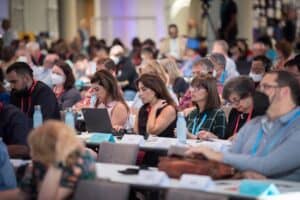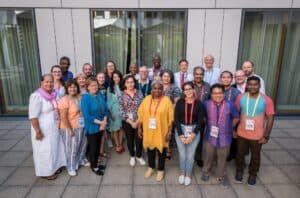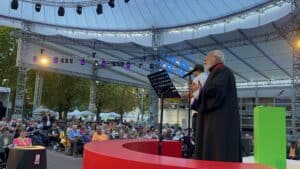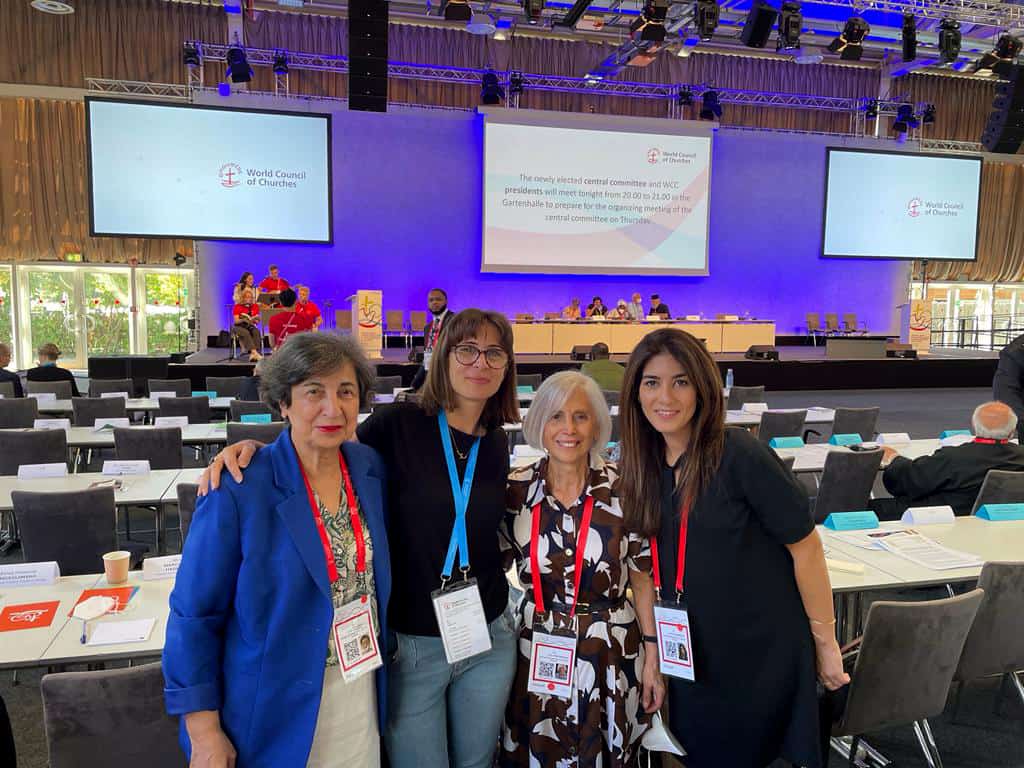Tamar Kanarian (Far Right) With Other Delegates
Tamar Kanarian, Secretary of the Executive Council of the Eastern Prelacy, was one of the twelve members of the delegation of the Catholicosate of the Great House of Cilicia that attended the 11th Assembly of the World Council of Churches in Karlsruhe, Germany. Ms. Kanarian, also a National Representative Assembly delegate from St. Stephens’ Church in Watertown, MA, shared her impressions in an emailed interview with Crossroads.

Crossroads: What is the scope of the WCC statement in support of Artsakh?
Tamar Kanarian: As background, the Artsakh conflict was part of the Public Issues Committee report. This group of delegates and advisors had a very difficult task to review, choose, and address very pressing concerns of members churches and participants. These range from climate change to human rights, gender equality, peace and justice in the Middles East and Europe, discrimination, and global health and well-being.
The Artsakh statement went into great depth of the conflict, referring to the 2020 war and Artsakh’s ongoing struggle for self-determination. The statement called on the United Nations, European Union, and authorities of Azerbaijan for the immediate release of Armenian civilian hostages and POWs in accordance with international Law. The statement reiterated the concern for the protection of holy sites and cultural heritage in the region and encourages UNESCO and all members of the international community to take all possible and appropriate measure to protect these sites.
Moreover, the statement urges for meaningful dialogue for a just and peaceful settlement of the conflict in the framework of the Minsk group, and requests that the WCC and all its member churches to remain engaged and vigilant in Christian solidarity for the people of Armenia and Artsakh in the search for just and sustainable peace.
Is there any pushback from WCC members?
Absolutely not. Of course, there were more sensitive topics that did have varying opinions; however, I am happy to report that the Artsakh and Armenia issue was overwhelmingly supported by the Assembly. As you know, the Armenians are not the only people currently fighting for their existence. There are other faith-based people, ethnic groups, that are facing incredibly difficult situations, and all are sympathetic to our issue and cause.

Can the WCC help Armenia and Artsakh in international fora?
Obviously, bringing the issue in front of 4,000 Assembly participants is an incredible forum. The WCC is a reputable, internationally recognized, and well-respected organization that can help address varying concerns of member churches.
When we go as a delegation, we are meeting with church representatives from all corners of the world, and we have that opportunity to speak on our issues in official and unofficial capacities. It is a personal and international opportunity to bring our cause to light.
How can Armenia and Artsakh benefit from Catholicos Aram’s presidency?
Ahead of his unanimous election to the presidency, His Holiness has had a meaningful and impactful role in the ecumenical world for decades, starting from his priesthood. Even before and after his role as moderator, twice, he has always had an active voice in ecumenical discussions, a voice that is welcomed and respected.
The Vehapar is one of eight presidents, and one of two representing the Orthodox Churches. And while the remaining six presidents are elected to represent the region they come from, the Orthodox presidencies represent the two families —Eastern Orthodox and Oriental Orthodox— and thus because these churches are present all over the world, the presidencies are supra-regional.
Catholicos Aram has always protected and pursued the interest of Armenia, the Diaspora, and our nation. He has also shared the concerns of all faithful around the world in his ecumenical work. I would be remiss not to recount that Aram Vehapar hosted ecumenical leaders in January 2020 in Antelias to discuss the future of ecumenism. Clearly, ecumenism is very important to the Catholicos.
How did the meeting impress you?
I really did not know what to expect and was completely blown away. Everything from the organization, facilities, programming, technology, logistics, it was an extremely professional environment. As an event planner myself, I was very intrigued in the coordination and impressed with how they handled all the facets of the Assembly. The level of coordination was intense, and we have to thank the WCC staff who traveled from all over, especially the volunteer stewards—young professionals who are serving their churches—who traveled from all over the world to make our stay that much better.
Our days were full —morning prayer, business plenary sessions, home groups, ecumenical conversations, thematic sessions, shared meals, evening prayer, and if you served on a committee, many more meetings that started early in the morning, or met after dinner, and even met over the weekend. It is clear that the WCC takes its mission seriously and relies on delegates to help plan and execute their agenda and mission.
As a quick background, the WCC is made up of more than 350 member churches. More than 500 delegates were present and in total 4,000 participants. We took over Karlsruhe, Germany!
 I was taken aback by all those who participated. As I mentioned, 4,000 individuals: lay, ordained, men, women, youth, from all countries, ethnicities, backgrounds and more, all traveled to be surrounded by those who are rooted in their faith, whatever their denomination is. I was simply in awe of all these people who truly live in their faith. Sometimes we get bogged down with the administrative and day-to-day happenings of keeping our church doors open and our parishes and communities functioning, that we get lost in our true mission as an Armenian Apostolic Church. I was reminded to keep growing in my faith, why we pray, what we believe and why we believe. It was so amazing to see complete strangers who have the slightest concept of the Orthodox Church, let alone the Armenian Apostolic Church, sing along to Krisdos Ee Mech, which Archbishop Gomidas Ohanian, our very own Srpazan, led under the prayer tent. It was beautiful to see and hear people sing along and trust in the words they were singing.
I was taken aback by all those who participated. As I mentioned, 4,000 individuals: lay, ordained, men, women, youth, from all countries, ethnicities, backgrounds and more, all traveled to be surrounded by those who are rooted in their faith, whatever their denomination is. I was simply in awe of all these people who truly live in their faith. Sometimes we get bogged down with the administrative and day-to-day happenings of keeping our church doors open and our parishes and communities functioning, that we get lost in our true mission as an Armenian Apostolic Church. I was reminded to keep growing in my faith, why we pray, what we believe and why we believe. It was so amazing to see complete strangers who have the slightest concept of the Orthodox Church, let alone the Armenian Apostolic Church, sing along to Krisdos Ee Mech, which Archbishop Gomidas Ohanian, our very own Srpazan, led under the prayer tent. It was beautiful to see and hear people sing along and trust in the words they were singing.
Tell us more about the work you did for the nominating committee.
It was a very eye-opening experience, one that I will never forget. Going into this trip, I did not know much about ecumenism, and strangely enough, I learned a lot by being part of this committee. I will try to explain it in the simplest terms. The Nomination Committee is responsible for presenting the slate of 150 individuals that will serve as the Central Committee for the next 7 years. The Central Committee is responsible for carrying out the programs and initiatives of the WCC for that period. Unlike organizations that I have been a part of where we must elect a body, there is no voting. We presented the slate and needed the consensus of the 500+ delegates. Prior to the Assembly, many churches submitted their candidates based on the number of seats their church was allotted. And over the course of the first few days of the Assembly, more were submitted. The day we met to begin the process, we had 209 names and needed to narrow them down to 150. It was puzzle in itself, because you have to keep in mind a lot of things: Lay vs ordained, male vs. female, youth, and regional representation. Then you have to think about church families and the traditions they maintain in their representation. You also need to consider previous patterns of representation and what other agreements church families have.
I learned about the history of the Orthodox Church and its role in the WCC. The Orthodox Church only has a 25 percent representation on the Central Committee and that is divided among the Eastern and Oriental Orthodox Churches. I became more familiar with our Oriental Church family and had to ensure the most equitable representation for our sister churches. I truly had a “hot baptism” in ecumenism (as one of my fellow delegates noted) and believe this is an area we should devote some time and educate others.
I was moved by how conscious many of my fellow delegates were in submitting a slate of individuals that would truly be composed of the best representation possible. Many faithful around the world, in various regions, are facing many challenges: societal, economic, political, and their impact on churches and the people is being felt. Many were clear and passionate about making sure we had equal representation but the best representation.

